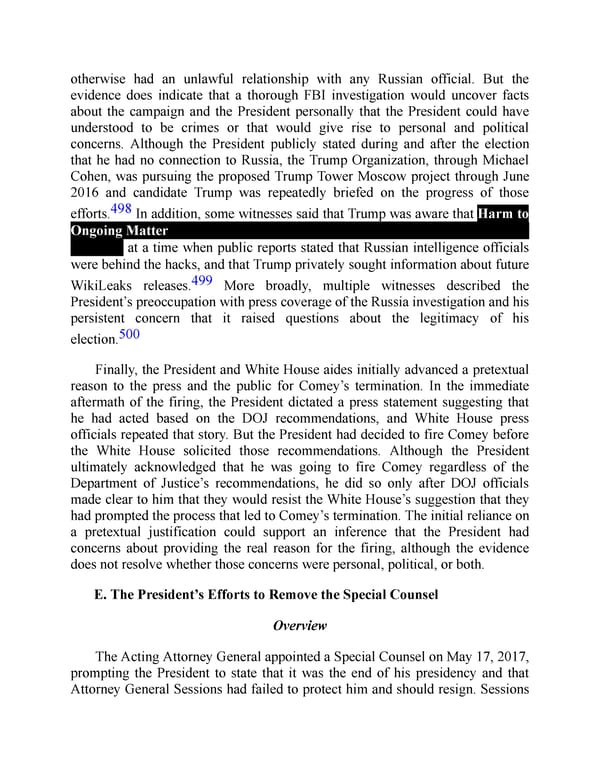otherwise had an unlawful relationship with any Russian official. But the evidence does indicate that a thorough FBI investigation would uncover facts about the campaign and the President personally that the President could have understood to be crimes or that would give rise to personal and political concerns. Although the President publicly stated during and after the election that he had no connection to Russia, the Trump Organization, through Michael Cohen, was pursuing the proposed Trump Tower Moscow project through June 2016 and candidate Trump was repeatedly briefed on the progress of those 498 efforts. In addition, some witnesses said that Trump was aware that Harm to Ongoing Matter█ █ █ █ █ █ █ █ █ █ █ █ █ █ █ █ █ █ █ █ █ █ █ █ █ █ █ █ █ █ at a time when public reports stated that Russian intelligence officials were behind the hacks, and that Trump privately sought information about future 499 WikiLeaks releases. More broadly, multiple witnesses described the President’s preoccupation with press coverage of the Russia investigation and his persistent concern that it raised questions about the legitimacy of his 500 election. Finally, the President and White House aides initially advanced a pretextual reason to the press and the public for Comey’s termination. In the immediate aftermath of the firing, the President dictated a press statement suggesting that he had acted based on the DOJ recommendations, and White House press officials repeated that story. But the President had decided to fire Comey before the White House solicited those recommendations. Although the President ultimately acknowledged that he was going to fire Comey regardless of the Department of Justice’s recommendations, he did so only after DOJ officials made clear to him that they would resist the White House’s suggestion that they had prompted the process that led to Comey’s termination. The initial reliance on a pretextual justification could support an inference that the President had concerns about providing the real reason for the firing, although the evidence does not resolve whether those concerns were personal, political, or both. E. The President’s Efforts to Remove the Special Counsel Overview The Acting Attorney General appointed a Special Counsel on May 17, 2017, prompting the President to state that it was the end of his presidency and that Attorney General Sessions had failed to protect him and should resign. Sessions
 Mueller Report PDF Page 344 Page 346
Mueller Report PDF Page 344 Page 346